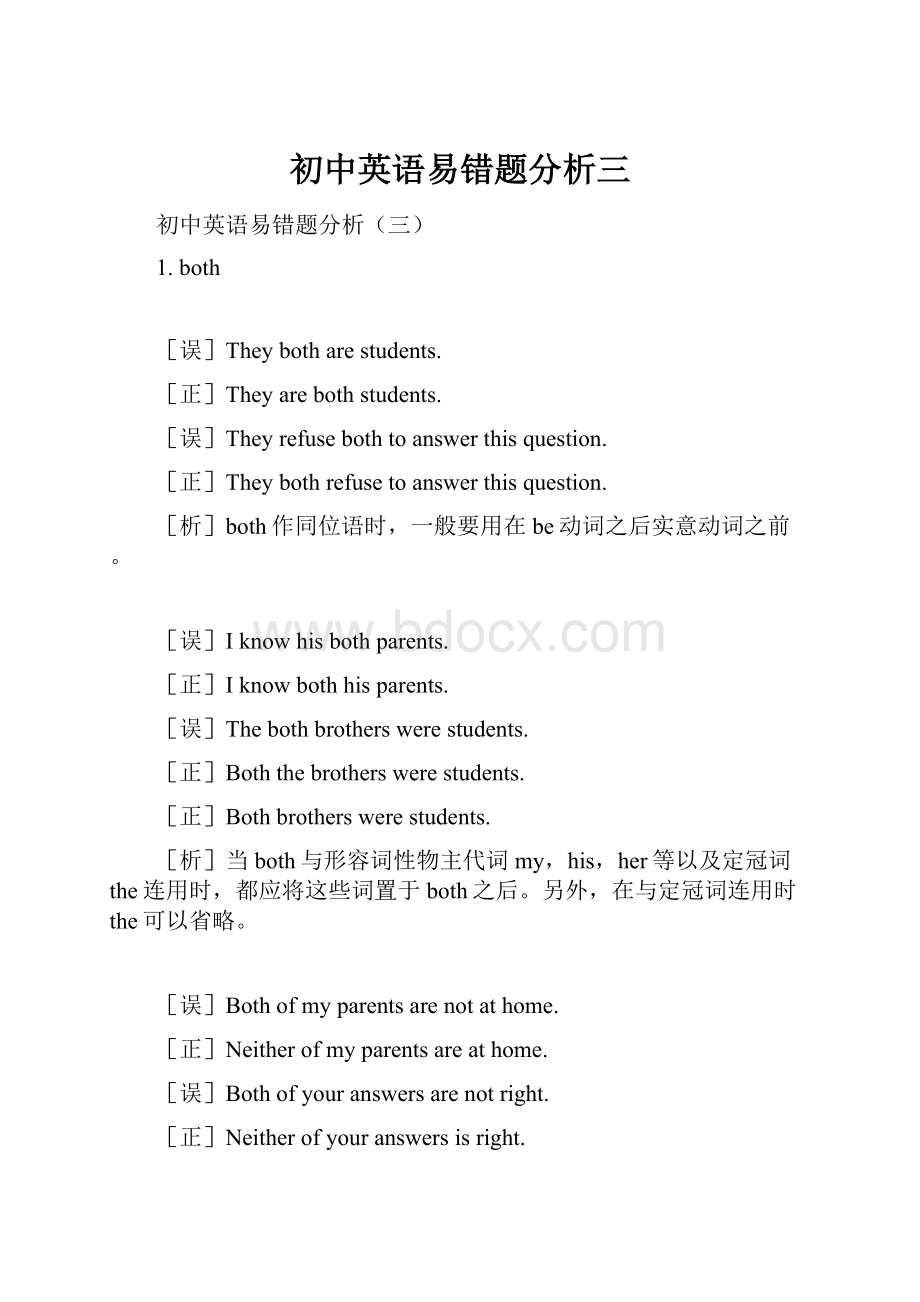初中英语易错题分析三.docx
《初中英语易错题分析三.docx》由会员分享,可在线阅读,更多相关《初中英语易错题分析三.docx(15页珍藏版)》请在冰豆网上搜索。

初中英语易错题分析三
初中英语易错题分析(三)
1.both
[误]Theybotharestudents.
[正]Theyarebothstudents.
[误]Theyrefusebothtoanswerthisquestion.
[正]Theybothrefusetoanswerthisquestion.
[析]both作同位语时,一般要用在be动词之后实意动词之前。
[误]Iknowhisbothparents.
[正]Iknowbothhisparents.
[误]Thebothbrotherswerestudents.
[正]Boththebrotherswerestudents.
[正]Bothbrotherswerestudents.
[析]当both与形容词性物主代词my,his,her等以及定冠词the连用时,都应将这些词置于both之后。
另外,在与定冠词连用时the可以省略。
[误]Bothofmyparentsarenotathome.
[正]Neitherofmyparentsareathome.
[误]Bothofyouranswersarenotright.
[正]Neitherofyouranswersisright.
[正]Bothyouranswersarewrong.
[析]both不能用于否定句中作主语。
表示“两者都不”时要用neither;但作宾语时both与either则都对,但要注意句意有所不同。
例如:
Icannotgivebothofthebookstoyou.(我不能将两本书全给你。
)而Icannotgiveeitherofthebookstoyou.(两本书中哪本书也不能给你。
)
2.bring
[误]PleasebringthisdictionarytoMrBrown.
[正]PleasetakethisdictionarytoMrBrown.
[误]Nexttime,pleasetakeyourlittlesisterhere.
[正]Nexttime,pleasebringyourlittlesisterhere.
[析]英语中bring是“带来”,而take是“带走”。
还有一个词fetch,表示“到某处去把某物取、接回来”。
如:
Pleasefetchthedoctoratonce.
3.business
[误]MyfatherwenttoShanghaiforbusiness.
[正]MyfatherwenttoShanghaionbusiness.
[析]onbusiness出差
4.busy
[误]Thestudentswereverybusytopreparefortheexam.
[正]Thestudentswereverybusypreparingfortheexam.
[析]bebusydoingsomething为“忙于作某事”。
[误]Thestudentswerebusyfortheexam.
[正]Thestudentswerebusywiththeexam.
[析]busy直接接名词时应用with。
5.but
[误]Hecouldn'thelpbutrealizingthathewaswrong.
[正]Hecouldn'thelpbutrealizethathewaswrong.
[误]Shecouldn'thelptocrywhenshesawhermother.
[正]Shecouldn'thelpcryingwhenshesawhermother.
[析]couldn'thelp其后应接动名词,表示情不自禁的动作,但couldn'thelpbut后面要加动词原形即省to的不定式,所以前一句应译为“他才真正认识到他错了。
”
6.buy
[误]Ihaveboughtthisdictionaryforthreeyears.
[正]Ihavehadthisdictionaryforthreeyears.
[析]buy是截止性(即瞬间)动词,它可以有完成时,如:
Ihaveboughtthisdictionary.但是不能与表示较长的时间状语连用。
如要讲我这本字典已买了3年了则要用havehad这一结构即我拥有这本字典已3年了。
7.by
[误]Theboyshotthecatbyagun.
[正]Theboyshotthecatwithagun.
[误]Hecametoschoolbyataxithismorning.
[正]Hecametoschoolbytaxithismorning.
[析]作为某种运输手段来讲,by与名词间不能有冠词,如:
bycar,bybike,byair等。
如有了冠词或其他修饰词,则应用别的相应的介词,如:
“我们今天早上是乘他的车来的”一句应译为:
Wecamehereinhiscarthismorning.与by结合而成的词组很多,常用的有:
bytheway顺便说说;byhand手工制作;byoneself独自地;bynomeans决不。
8.call
[误]I'llcallatMrBrown.
[正]I'llcallonMrBrown.
[误]I'llcallonMrBrown'shome.
[正]I'llcallatMrBrown'shome.
[析]作“拜访”讲时,at后面接访问地点,而on后面接访问的人。
callon,dropin,visit
callon比较正式的为公务的访问,如:
Wewerecalledonbytheoldstudents.而dropin则是比较随便的走走,顺便拜访,如:
Ifyou'refree,dropin.而visit则是更正式的外交访问或友好往来,如:
Myschool'sheadmasterwillvisitAmericanextweek.
9.can
[误]Ablindmancannotjudgecolours.
[正]Ablindmancannotjudgecolours.
[误]Icann'tcallforyouatten.
[正]Ican'tcallforyouatten.
[析]can的否定形式应为cannot或can't.
[误]It'sonlysixo'clock.Thatmustn'tbethepostman.
[正]It'sonlysixo'clock.Thatcan'tbethepostman.
[析]must用来表示一种肯定的推断,如:
Shemusthavesomeproblems.Shekeepscrying.但在否定句中则要用can't,要表示对过去的推测则要用“must+have+过去分词”的表达法,如:
Thelightshavegoneout.Afusemusthaveblown.而对过去的否定推测则多用“can't+have+过去分词”,如:
Idon'tthinkhecanhaveheardyou.Callagain.
[误]Wecouldnothelptolaughatonce.
[正]Wecouldnothelplaughingatonce.
[正]Wecouldnothelpbutlaughatonce.
[析]“couldn'thelp+动名词”表示禁不住做了某事。
但couldnothelpbut与couldnotbut后面要加不带to的不定式,意思都是不得不去做某事.如:
Youcouldnot(help)butrespecthim.
can,beableto
can与beableto都可以用来表示能力,但can只有现在时与过去时,beableto则可用任何时态,如:
Hewillbeabletoteachthechild.但要表示经过努力而达到的一次性动作则只能用beableto,如:
Hefinallywasabletojumpover210meters.或:
Theplanewasabletoflyoverthemountain.但要注意的是这两个词都没有进行时态,而beableto后面不接不定式的被动态。
can,could
can与could都可以用在现在时的口语中,只是用could更为礼貌,语气更委婉。
如:
Couldyoutellusastory?
10.care
[误]Idon'tcarecoffee.
[正]Idon'tcareforcoffee.
[误]Takecareforyoursteps.
[正]Takecareofyoursteps.
[析]carefor是“对某物感兴趣”,而careof是“关心,要当心某事”,如:
Shedidn'tcareforhim.Takecareofwhatyouaredoing.
[误]Idon'tcarewherewewillgoifitdoesn'train.
[正]Idon'tcarewherewegoifitdoesn'train.
[析]在itdoesn'tmatter,Idon'tcare,Idon'tmind,及incase引出的状语从句后面要用现在时表示将来。
如:
I'vegotafootballincasewehavetimeforagame.
1.come
[误]Icameacrosswithanoldfriendinthestreetyesterday.
[正]Icameacrossanoldfriendinthestreetyesterday.
[析]comeacross是“偶然碰见、遇见”,要直接加宾语,如:
I'vejustcomeacrossabeautifulpoeminthismagazine.
[误]A:
Wheredoyoucomefrom?
B:
Icomefromthestation.
[正]A:
Wheredidyoucomefrom?
B:
Icamefromthestation.
[正]A:
Wheredoyoucomefrom?
B:
IcomefromChina.
[析]Wheredoyoucomefrom?
意为“你是什么地方的人?
”而Wheredidyoucomefrom?
则是“你从何处来?
”
[误]Thestarsarecomingoutfromthecloud.
[正]Thestarsarecomingoutofthecloud.
[析]comeoutof意为“从……地方出来”。
comein,comeinto,enter
comein与comeinto的意义相同,但comeinto后面要加宾语,而comein后面不用宾语。
如Ifoundsomeonecameintomyroom.Thedooropenedandthechildcamein.
enter常作为及物动词使用,如:
ThebusenteredtheEnglishtunnel.
2.congratulate
[误]Iwanttocongratulateyouforyoursuccesswithallmyheart.
[正]Iwanttocongratulateyouonyoursuccesswithallmyheart.
[析]动词congratulatesomebodyonsomething是“向某人祝贺某事”。
其名词congratulation在用时一般要用复数,如:
Iofferedhimmycongratulationsonhissuccess.又如:
Congratulations!
3.cook
[误]Myfatherisagoodcooker.
[正]Myfatherisagoodcook.
[析]很多动词加上er则变为执行该动作的一种人,如work---worker,teach---teacher.但cook即是动词“做饭”,同时名词也是“厨师”。
而cooker则是“厨具”、“炊具”之意。
如:
Iwillcookthedinner.Iboughtagoodpresscooker(高压锅)。
4.corner
[误]Thereisapostofficeinthecornerofthestreet.
[正]Thereisapostofficeatthecornerofthestreet.
[误]Agirlsatatthecorneroftheroom.
[正]Agirlsatinthecorneroftheroom.
[析]inthecorner是在建筑物内部的角上,而atthecorner是在外部的角上,如:
Thereisabigtreeatthecornerofthebuilding.
5.cost
[误]Icosttendollarsforthebook.
[正]Ispenttendollarsonthebook.
[误]Icosttwohourstodomyhomework.
[正]Ittookmetwohourstodomyhomework.
[析]cost,spend,take都可以作“花费”讲,但用法不同。
cost的用法是“something+cost+somebody+时间或金钱”,如:
Thebookcostmetendollars.spend的用法是“somebody+spend+时间+(in)doingsomething”,如:
Ispenttwohours(in)writingthisbook.或“somebody+spend+金钱+onsomething”,如:
Ispendtwodollarsonthisbook.而take的用法则要用逻辑主语it:
“It+takes+somebody+时间+todosomething”,如:
Ittookmeanhourtocleantheclassroom.
6.country
[误]Youcanfindcowsinacountry.
[正]Youcanfindcowsinthecountry.
[析]country即可作“国家”讲,也可作“农村”讲。
当作“农村”讲时,一定要加定冠词,而且只有单数形式。
[误]Farmersliveinthecountries.
[正]Farmersliveinthecountry.
[析]但作为“国家”讲时则可有单、复数形式,例如:
JapanisanAsiancountry.Japan,China,andIndiaareAsiancountries.另外,country一般指的是地理概念上的国家,如:
NewZealandisanagriculturalcountry.而nation多指民族组成的国家,如:
TheChinesenation(中华民族)。
state多侧重于政权方面的区域、国家范围,如:
thestatefarm(国营农场)。
7.cross
[误]Therearetrafficlightsatthecross.
[正]Therearetrafficlightsatthecrossing.
[析]cross作为名词讲时是十字架、十字形的东西,如:
RedCross(红十字会)。
[误]Thelittleboyisgoingtoacrossthestreet.
[正]Thelittleboyisgoingtocrossthestreet.
[析]across是副词或介词,但不能作动词用。
cross,pass
cross是指横过某地,如:
Hecrossedthesquare.而pass则强调从某物体旁经过,如:
ImailedsomeletterswhenIpassedthepostoffice.
8.crowd
[误]Theroomsoonwascrowdedbypeople.
[正]Theroomsoonwascrowdedwithpeople.
[析]crowded在这句话中应作为形容词,所以这句话不是被动语态而是系表结构,如:
Theroomwascrowdedwithbooks.
9.cup
[误]Asilverglasswasgiventothewinner.
[正]Asilvercupwasgiventothewinner.
[误]Mymotherwaslookingforthewhiskycup.
[正]Mymotherwaslookingforthewhiskyglass.
[析]glass一般指由玻璃制成的器皿,而cup多指用陶瓷或金属制成的杯子,且cup尤其用在奖杯上。
喝酒多用的是玻璃制成的杯子,如我们讲Idrinkaglassofwineatsupper.而不讲Idrinkacupofwineatsupper.
10.dance
[误]We'llinviteyouandyourwifetoadanceparty.
[正]We'llinviteyouandyourwifetoadancingparty.
[正]We'llinviteyouandyourwifetoadance.
[正]We'llinviteyouandyourwifetoaball.(美语中常用ball作为舞会。
)
1.change
[误]Iwanttochangemycamerawiththatone.
[正]Iwanttochangemycameraforthatone.
[析]changefor为“以某物为交换物”。
而changewith则是“随……而变”,如:
Thewood'scolourchangedwiththeseason.
2.cheap
[误]Ateacher'ssalaryisgenerallyverycheap.
[正]Ateacher'ssalaryisgenerallyverylow.
[析]工资的高低要用low,cheap是指价格便宜,如果要讲物美价廉则要用notexpensive,如:
Thiscarisnotexpensive.
3.choose
[误]WeeachhadtohaveachooseofAorB.
[正]WeeachhadtohaveachoiceofAorB.
[析]choice是名词,而choose是动词。
4.class
[误]TheclassiswatchingTV.
[正]TheclassarewatchingTV.
[析]class作主语时,如果作为整体讲则应用单数形式的谓语动词,如:
Theclasswasmorethanfortyinnumber.如考虑到具体的每个成员时则应用复数形式的谓语动词,如:
Theclassare,ingeneral,verybright.
5.clean
[误]Sorry,Ididn'tboughtithere.Icleanlyforgot.
[正]Sorry,Ididn'tboughtithere.Icleanforgot.
[析]clean可以作为副词讲,其意为“完全”,而cleanly则意为“正确地”、“干净利落地”,如:
Theknifedoesn'tcutcleanly.而clean作为形容词讲时意为“清洁的”、“干净的”,如:
Herfaceisnotcleannow.
6.clever
[误]I'mnotcleverinEnglish.
[正]I'mnotcleveratEnglish.
[析]cleverat是固定搭配,表示在某方面有特长。
7.close
[误]Itiscoldoutside.Pleasekeepthedoorclose.
[正]Itiscoldoutside.Pleasekeepthedoorclosed.
[析]这里的close是动词,意为“关闭”,而keep后要加形容词,所以要用close的过去分词形式closed作形容词。
作形容词用的close意为“近的”、“亲密的”。
[误]ComecloselysothatIcanseeyou.
[正]ComeclosesothatIcanseeyou.
[误]Goodteachingandgoodtestingarecloserelated.
[正]Goodteachingandgoodtestingarecloselyrelated.
[析]close,closely同样可以作副词用,但其意义不同,close是“靠近”、“接近”之意,而closely则是“紧密”、“严密”、“密切”之意。
[误